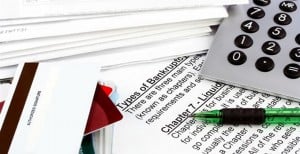Milwaukee Chapter 7 Bankruptcy Attorney
Stop collection calls, stop garnishments, and keep your property!
Lombardo Law Office has experienced chapter 7 bankruptcy attorneys to help with your personal situation. In most cases, people who file a Chapter 7 Bankruptcy in Milwaukee have become overwhelmed with debt as a result of job loss, serious illness, divorce, death of a family member, or simply rising interest rates. The purpose of a Chapter 7 Bankruptcy is to allow a person to obtain a fresh start, free from creditors and free from the pressure of overwhelming debt.
The attorneys of Lombardo Law will file a petition on your behalf asking the court to discharge (wipe out) unsecured debt, which typically includes credit card debt, medical bills, payday loans, utility bills, back rent, uninsured accidents, judgments, overdrafts, deficiencies on repossessed vehicles, certain types of tax debts, and other debts.
When should you consider filing for Chapter 7 Bankruptcy?
If you answer yes to one of more of the following questions, then you may want to consider contacting Lombardo Law Office for your free consultation with a bankruptcy attorney. We are here to help you!
- Is your debt, not including car and home loans, more than your annual salary?
- Are your monthly payments over 25% of your take home pay?
- Are you frequently late on payments?
- Do you buy necessities like food, gas, or clothing on credit?
- Are you considering taking out a loan to pay other loans or debts?
- Are your debts increasing monthly?
- Do you take cash advances or borrow from friends or relatives?
- Do you have medical bills over $5,000?
- Do you pay 20% interest on most of your debts?
- Are creditors calling?
- Are you unable to afford auto insurance?
- No money in savings?
- Are your wages being garnished?
- Are you being turned down for credit?
- Are you getting divorced and have too many bills to pay?
- Are financial difficulties causing marital problems?
- Has your automobile been repossessed and you now face a deficiency balance?
- Are you considering surrendering your home as a result of job loss or market devaluation?
What is Chapter 7 bankruptcy?
The most commonly used form of bankruptcy, Chapter 7, provides honest debtors who have limited financial means with a fresh start by eliminating many of a debtor’s most common financial obligations such as medical debt, credit card debt, past due utilities, payday loans, back rent, auto accidents, amounts owed on repossessed vehicles, and judgments through the discharge (which is generally granted at the end of the case).
Your chapter 7 bankruptcy attorney can determine which debts are not discharged in a Chapter 7 bankruptcy:
It is important to understand that not all debts are subject to discharge under Chapter 7. Among the common debts unaffected by bankruptcy are certain income and business taxes, alimony, child support, property divisions incident to divorce, governmentally imposed fines, forfeitures or restitution, most student loans, and liabilities resulting from drunken driving. Certain abuses of cash advances and credit cards on the eve of bankruptcy are presumed to be non-dischargeable, as are debts arising from fraud, misrepresentation, theft, and willful and malicious injuries to a person or property.
For these latter forms of debts to be held non-dischargeable, the creditor must bring a lawsuit against the debtor in the bankruptcy court within 90 days of the filing, and obtain a judgment declaring the debt, or some portion thereof, to be non-dischargeable. In such a proceeding, the debtor has most of the rights attendant to any other civil trial in federal court, except the right to a jury trial.
The entire discharge may be denied or revoked if the debtor has engaged in fraud (such as making false statements, concealing assets, or fraudulently transferring assets) before, in, or in connection with the case. Proceedings to deny or revoke a discharge are subject to the right to a nonjury trial on the merits, as are claims for non-dischargeability of debts.
What property may I keep in a Chapter 7 bankruptcy?
Wisconsin law provides certain protections, called exemptions, that restrict the types of property a creditor holding a judgment may seize and sell to satisfy the creditor’s claim. The federal bankruptcy laws also contain certain property exemptions that protect similar assets, but in quite different amounts. Specific dollar-value of these exemptions are not listed here because they are subject to legislative change.
The types of property for which exemptions are permitted include a specified amount of equity in, among other things, one’s personal residence, vehicles, household goods and personal effects, tools of trade, life insurance, and even deposit accounts. Qualified retirement benefits typically may be excluded from the bankruptcy estate in whole or in part. The vast majority of all people filing bankruptcy under Chapter 7 are able to keep all of their property.
When a debtor’s property (called collateral) is secured by a lien (such as a home mortgage, vehicle purchase loan, some furniture purchases, and so on), the debtor must decide whether to retain it or surrender it to the secured creditor. If the decision is to surrender the collateral, the unpaid portion of the loan (or any deficiency after sale of the collateral) generally is subject to discharge along with the unsecured debts.
Chapter 7 Bankruptcy will Help You:
- Eliminate most/all debt obligations
- Stop harassing phone calls
- Stop garnishments
- Prevent utility shut off
- Restore disconnected utilities
- Obtain a fresh start
- Keep your property
- Keep your driver’s license
If you’re in need of a Chapter 7 Bankruptcy Attorney, contact Lombardo Law Offices today!

